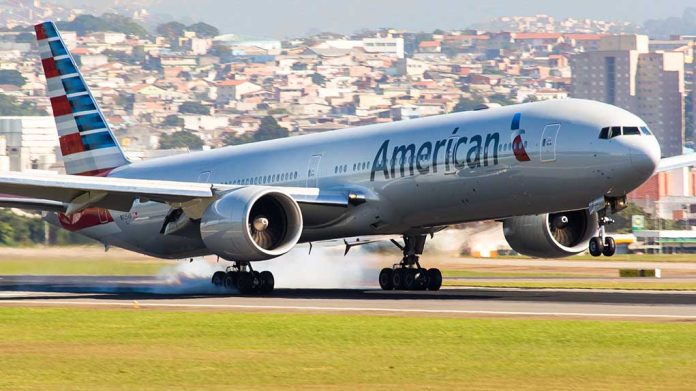
An American Airlines flight was grounded for hours at Austin Airport due to a Wi-Fi hotspot named “I have a bomb,” triggering a full-scale security response.
Key Takeaways
- American Airlines Flight 2863 from Austin to Charlotte was delayed over 4 hours due to a suspicious Wi-Fi hotspot name.
- All passengers were evacuated, re-screened, and their luggage was inspected on the tarmac.
- No passenger admitted to creating the hotspot, despite police intervention.
- The TSA emphasized they take bomb threats very seriously, even if potentially a prank.
- The incident highlights the severe consequences of irresponsible behavior in air travel.
Bomb Threat Hoax Disrupts American Airlines Flight
On a routine day at Austin Airport, American Airlines Flight 2863, bound for Charlotte, North Carolina, found itself at the center of a security scare. The flight, originally scheduled to depart at 1:42 p.m., was abruptly halted when a Wi-Fi hotspot with the alarming name “I have a bomb” was detected on board. This discovery set in motion a chain of events that would disrupt travel plans and test the mettle of airport security protocols.
As news of the suspicious Wi-Fi name spread, authorities swiftly responded. Police boarded the plane, suspecting a possible prank, and requested that the responsible passenger identify themselves. When no one came forward, the situation escalated. All passengers were escorted off the aircraft and subjected to a second round of security screening, a process that would contribute to a delay lasting over four hours.
American Airlines flight delayed with 'bomb threat' over passenger's Wi-Fi name. pic.twitter.com/qJw3gOugeL
— Daily Mail Online (@MailOnline) February 10, 2025
Rigorous Security Measures Enacted
In line with standard procedures for potential threats, a comprehensive security sweep was initiated. Luggage was removed from the aircraft and meticulously inspected on the tarmac. A bomb-sniffing dog was brought in to check for explosives, leaving no stone unturned in ensuring the safety of all passengers and crew. “We take bomb threats very seriously,” stated a Transportation Security Administration spokesperson, underlining the gravity with which such incidents are treated, regardless of their potential to be hoaxes.
The Austin Police Department and Department of Aviation were promptly notified, showcasing the multi-agency approach to aviation security. A police lieutenant addressed the passengers, offering a stern warning against jokes and a final opportunity for the responsible party to come forward without severe consequences.
Passenger Frustration and Flight Delays
As the security procedures unfolded, passenger frustration mounted. One traveler recounted, “Cue the groaning from the entire f***ing plane when the cop announced this,” highlighting the collective exasperation of those caught in the ordeal. The re-screening process was thorough, with passengers required to show their hotspots to police as they were escorted off the plane in groups. “Eventually we are able to board again and take off but the whole thing was just so f***ing infuriating because after all that they were not even able to determine who the hell did this s***,” another passenger vented, encapsulating the sentiment of many affected by the delay.
Despite the extensive measures taken, the culprit behind the ill-named hotspot was not identified. The flight finally departed at 6:15 p.m., more than four hours behind schedule, after the aircraft was thoroughly cleared of any threats.
Implications for Air Travel Security
This incident serves as a stark reminder of the heightened state of alertness in air travel security. It demonstrates the serious repercussions that can stem from what may have been intended as a prank or thoughtless action. The disruption caused by a single Wi-Fi hotspot name underscores the delicate balance between maintaining stringent security measures and facilitating smooth air travel operations.
While the Austin Airport reported no significant impacts on its overall operations, the incident serves as a cautionary tale for all air travelers. It reinforces the need for passengers to be mindful of their actions and the potential consequences of behavior that could be perceived as threatening, even if unintentional. As air travel continues to face various security challenges, incidents like these remind us of the ongoing vigilance required to ensure the safety of all who take to the skies.
Sources:
American Airlines Flight Delayed Amid Suspected Bomb Threat
American Airlines flight delayed by suspected bomb threat
American Airlines flight delayed over Wi-Fi hotspot named, ‘There is a bomb on the flight’







